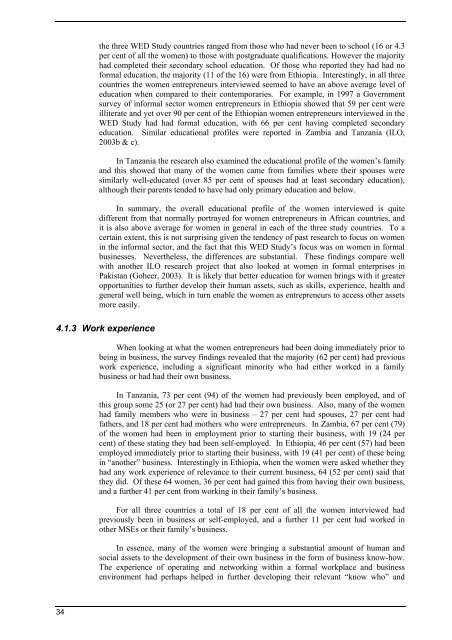The Challenges of Growing Small Businesses - International Labour ...
The Challenges of Growing Small Businesses - International Labour ...
The Challenges of Growing Small Businesses - International Labour ...
You also want an ePaper? Increase the reach of your titles
YUMPU automatically turns print PDFs into web optimized ePapers that Google loves.
the three WED Study countries ranged from those who had never been to school (16 or 4.3<br />
per cent <strong>of</strong> all the women) to those with postgraduate qualifications. However the majority<br />
had completed their secondary school education. Of those who reported they had had no<br />
formal education, the majority (11 <strong>of</strong> the 16) were from Ethiopia. Interestingly, in all three<br />
countries the women entrepreneurs interviewed seemed to have an above average level <strong>of</strong><br />
education when compared to their contemporaries. For example, in 1997 a Government<br />
survey <strong>of</strong> informal sector women entrepreneurs in Ethiopia showed that 59 per cent were<br />
illiterate and yet over 90 per cent <strong>of</strong> the Ethiopian women entrepreneurs interviewed in the<br />
WED Study had had formal education, with 66 per cent having completed secondary<br />
education. Similar educational pr<strong>of</strong>iles were reported in Zambia and Tanzania (ILO,<br />
2003b & c).<br />
In Tanzania the research also examined the educational pr<strong>of</strong>ile <strong>of</strong> the women’s family<br />
and this showed that many <strong>of</strong> the women came from families where their spouses were<br />
similarly well-educated (over 85 per cent <strong>of</strong> spouses had at least secondary education),<br />
although their parents tended to have had only primary education and below.<br />
In summary, the overall educational pr<strong>of</strong>ile <strong>of</strong> the women interviewed is quite<br />
different from that normally portrayed for women entrepreneurs in African countries, and<br />
it is also above average for women in general in each <strong>of</strong> the three study countries. To a<br />
certain extent, this is not surprising given the tendency <strong>of</strong> past research to focus on women<br />
in the informal sector, and the fact that this WED Study’s focus was on women in formal<br />
businesses. Nevertheless, the differences are substantial. <strong>The</strong>se findings compare well<br />
with another ILO research project that also looked at women in formal enterprises in<br />
Pakistan (Goheer, 2003). It is likely that better education for women brings with it greater<br />
opportunities to further develop their human assets, such as skills, experience, health and<br />
general well being, which in turn enable the women as entrepreneurs to access other assets<br />
more easily.<br />
4.1.3 Work experience<br />
When looking at what the women entrepreneurs had been doing immediately prior to<br />
being in business, the survey findings revealed that the majority (62 per cent) had previous<br />
work experience, including a significant minority who had either worked in a family<br />
business or had had their own business.<br />
In Tanzania, 73 per cent (94) <strong>of</strong> the women had previously been employed, and <strong>of</strong><br />
this group some 25 (or 27 per cent) had had their own business. Also, many <strong>of</strong> the women<br />
had family members who were in business – 27 per cent had spouses, 27 per cent had<br />
fathers, and 18 per cent had mothers who were entrepreneurs. In Zambia, 67 per cent (79)<br />
<strong>of</strong> the women had been in employment prior to starting their business, with 19 (24 per<br />
cent) <strong>of</strong> these stating they had been self-employed. In Ethiopia, 46 per cent (57) had been<br />
employed immediately prior to starting their business, with 19 (41 per cent) <strong>of</strong> these being<br />
in “another” business. Interestingly in Ethiopia, when the women were asked whether they<br />
had any work experience <strong>of</strong> relevance to their current business, 64 (52 per cent) said that<br />
they did. Of these 64 women, 36 per cent had gained this from having their own business,<br />
and a further 41 per cent from working in their family’s business.<br />
For all three countries a total <strong>of</strong> 18 per cent <strong>of</strong> all the women interviewed had<br />
previously been in business or self-employed, and a further 11 per cent had worked in<br />
other MSEs or their family’s business.<br />
In essence, many <strong>of</strong> the women were bringing a substantial amount <strong>of</strong> human and<br />
social assets to the development <strong>of</strong> their own business in the form <strong>of</strong> business know-how.<br />
<strong>The</strong> experience <strong>of</strong> operating and networking within a formal workplace and business<br />
environment had perhaps helped in further developing their relevant “know who” and<br />
34
















